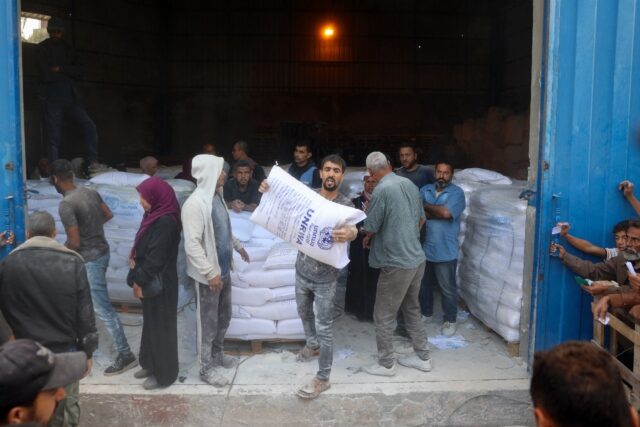Israel formally notified the United Nations it was cutting ties with the agency supporting Palestinian refugees, it said Monday, after lawmakers voted to ban the organisation vital to the occupied territories.
The ban, which sparked global condemnation including from key Israeli backer the United States, should come into force in late January, with the UN Security Council warning it would have severe consequences for millions of Palestinians.
Israel has accused a dozen employees of the agency, UNRWA, of taking part in the October 7, 2023 attack by Hamas, the deadliest in Israeli history.
“On the instruction of Foreign Minister Israel Katz, the ministry of foreign affairs notified the UN of the cancellation of the agreement between the State of Israel and UNRWA,” the foreign ministry said in a statement.
Katz was quoted as saying UNRWA was “part of the problem in the Gaza Strip and not part of the solution”.
Hamas’s October 7 attack on Israel resulted in the deaths of 1,206 people, mostly civilians, according to an AFP tally of Israeli official figures.
Israel’s retaliatory campaign has killed 43,374 people in Gaza, most of them civilians, according to figures from the Hamas-run territory’s health ministry, which the United Nations considers to be reliable.
‘People will starve’
The letter sent by Israel to the president of the UN General Assembly, dated November 3 and seen by AFP, said the ban would come into effect “following a three-month period”.
Jonathan Fowler, an UNRWA spokesman, told AFP the move would be disastrous for aid efforts in Gaza.
“If this law is implemented, it would be likely to cause the collapse of the international humanitarian operation in the Gaza Strip — an operation of which UNRWA is the backbone,” Fowler told AFP.
Philippe Lazzarini, UNRWA’s Commissioner-General, wrote on X that an average of just 30 trucks were allowed daily into Gaza last month, saying it was the lowest number “in a long time” and “cannot meet the needs of over two million people”.
Gazans told AFP they were alarmed at the move.
“People will starve and will not be able to provide food for their children,” said Houria Abu Sharkh, a woman who was displaced from Gaza City.
Abdul Karim Kallab from the southern city of Khan Yunis said the people “depend almost entirely on aid coming from abroad, especially from UNRWA”, and without it they would starve.
Hamas said it showed that Israel was a “rogue state”.
But Israel has portrayed UNRWA as just one of several players, and Katz said his country would continue to help get aid into the Gaza Strip “in a manner that does not harm the security of the citizens of Israel”.
UNRWA has also raised the alarm about the situation in the West Bank and East Jerusalem, where services “including education, healthcare, and sanitation” are also imperilled by the ban, according to Fowler.
The General Assembly, the body that originally set up UNRWA, will hold a session on the issue on Wednesday — scheduled before Israel sent the letter — and is likely to be briefed by Lazzarini.
‘Respond firmly’
A series of probes, including one led by former French foreign minister Catherine Colonna, found some “neutrality related issues” at UNRWA but stressed that Israel had not provided evidence for its chief allegations.
UNRWA, which employs thousands of people across the Palestinian territories and beyond, fired nine employees after an internal probe found that they “may have been involved in the armed attacks of 7 October”.
UNRWA was established in 1949 after the first Arab-Israeli conflict following Israel’s creation in 1948.
Its mandate has since been repeatedly extended in the absence of a solution for Palestinian refugees.
Since late September, Israel has broadened the focus of its war to Lebanon, where it stepped up a campaign against Hamas ally Hezbollah following nearly a year of cross-border fire.
Israeli Prime Minister Benjamin Netanyahu visited the Lebanon border on Sunday and told troops the aim of the operation was to push Hezbollah back over the Litani River, which flows across southern Lebanon.
He said a second goal was to stop any attempt to rearm and the third was “to respond firmly to any action taken against us”, according to his office.
Lebanon strikes
Israel launched a massive aerial campaign in late September primarily targeting Hezbollah strongholds across Lebanon and sent in ground troops on September 30.
The war in Lebanon has killed more than 1,940 people since September 23, according to an AFP tally of Lebanese health ministry figures, though the real toll is likely higher.
On Monday, the Israeli military said it had killed a top Hezbollah commander responsible for launching rocket and anti-missile attacks against Israeli forces in south Lebanon.
Hezbollah, which like Hamas is backed by Iran, said it fired rockets at the northern Israeli city of Safed on Monday.
Hezbollah has said it is acting in support of Hamas in Gaza, though many in both Lebanon and the Palestinian territory are clamouring for a ceasefire as the humanitarian situation worsens.
Israeli jets carried out strikes on Monday targeting several areas of southern Lebanon, according to the official National News Agency (NNA).
In Bazouriyeh, near the south Lebanese city of Tyre, the NNA said rescuers were looking for people missing under the rubble after a strike on Sunday.
burs-jxb/jsa

COMMENTS
Please let us know if you're having issues with commenting.